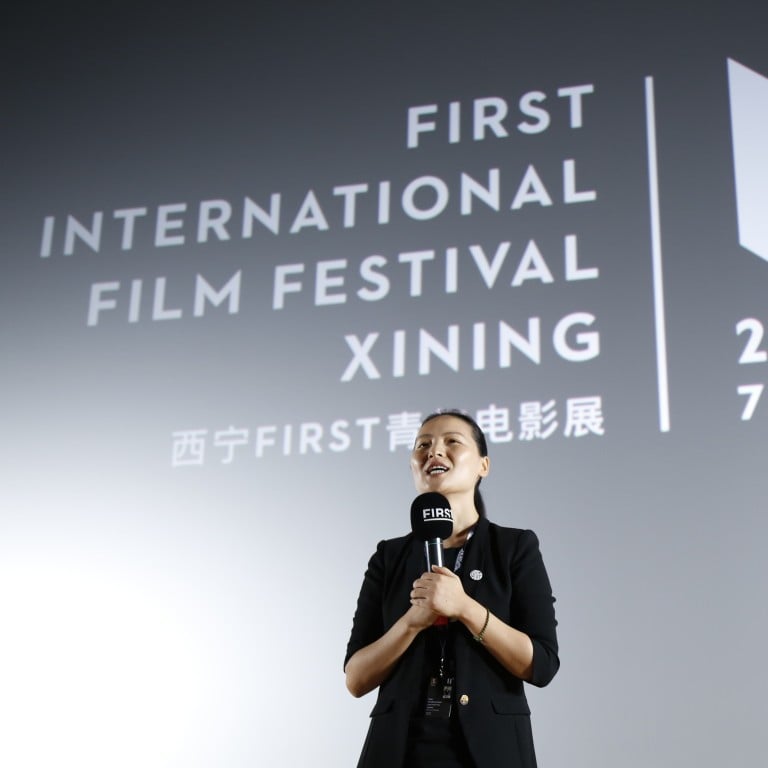
Chinese festival co-founder rips online critics who pan films on review websites
- Negative comments posted online about movies shown at the FIRST International Film Festival anger its chief executive, who fears investors will be put off
- Mainly young film-goers at event in remote Qinghai province show little patience for subtle and avant-garde films, preferring more accessible ones
After leaping on stage ahead of a screening of first-time director Xu Lei’s Summer Detective, Li began a long and impassioned tirade against viewers who choose to air their displeasure towards the films they watch during the festival. What dismays her, it seems, are the disparaging messages that appear on Douban, China’s equivalent to IMDB.com, and the low marks given to certain titles up for official festival voting.
While cinephiles might be big-hearted towards the young filmmakers, Li said, investors might balk. These financiers, she continued, could easily withdraw further support from the maligned titles or even refrain from funding future projects from new directors.
“The starting point for all these films should be seven [out of 10],” she said, perhaps referring to the surprisingly low marks internet users gave to some of the works in competition at FIRST this year. While Li’s request to audiences to show support for films regardless of their quality might be questionable, her dismay is understandable given the “short reviews” on Douban. While some entries do offer substantial and contemplative criticism of the films, most are one-liners, more emotional reaction than contextualised evaluation.

The mauling of Lei Lei’s Breathless Animals exemplifies this problem. Admittedly, the film is avant garde, delirious, a collage of found footage and experimental animation, and FIRST’s programmers should probably have thought twice before placing that alongside the more accessible and narrative-driven titles in official competition.
Douban’s snarkier remarks described viewers having fallen asleep during what they called a “PowerPoint movie”.
Gu Xiaogang’s Dwelling in the Fuchun Mountains was among the more well-received films, but got its share of Douban panning. A subtle, poetic look at the changes in contemporary Chinese society through shifting family fortunes in a second-tier city, the movie has attracted admirers aplenty, both abroad and at home, since its world premiere at the Cannes Film Festival in May. But it still managed to attract criticism for its long takes and understated drama – a style very much at odds with grittier and more accessible titles that received high ratings online.
One of those is Fish Park, a rough drama revolving around a group of listless drifters in Beijing. Chai Xiaoyu’s debut was rapturously received by FIRST’s largely young audience, who applauded wildly when two of the film’s characters lunged at each other for a passionate kiss. Such reception to raw, on-screen emotion is telling for what sort of features may be chosen in future.

Wang Jing’s second feature, Changfeng Town, is an imaginative, humanistic piece centred on a small, timeless Chinese town. Consensus was that the film was “too stylised”, which distracted from Wang’s delicate story and the moving performances she teased out of her actors.
There were other gems as well: set among a family of three living in downtown Guangzhou – with the parents played by veteran Hong Kong stage actors Ko Hon-man and Pang Hang-ying – Huang Zi’s All About ING manages to convey both the delicate bonds among characters and their relationship to their cramped surroundings.
Yang Lina’s Spring Tide portrays vividly an utterly believable conflict between a middle-aged journalist (played by Hao Lei) and her mother (Elaine Jin Yan-ling), while Wang Lina’s already much travelled A First Farewell provides a moving glimpse into the tribulations of Uygurs in Xinjiang, told through children struggling to survive in a Han-dominated society.
Sometimes, it’s perhaps better to let the films do the talking – but if the online comments are any indication, the audience might also need to be patient and do a bit of thinking as well.

